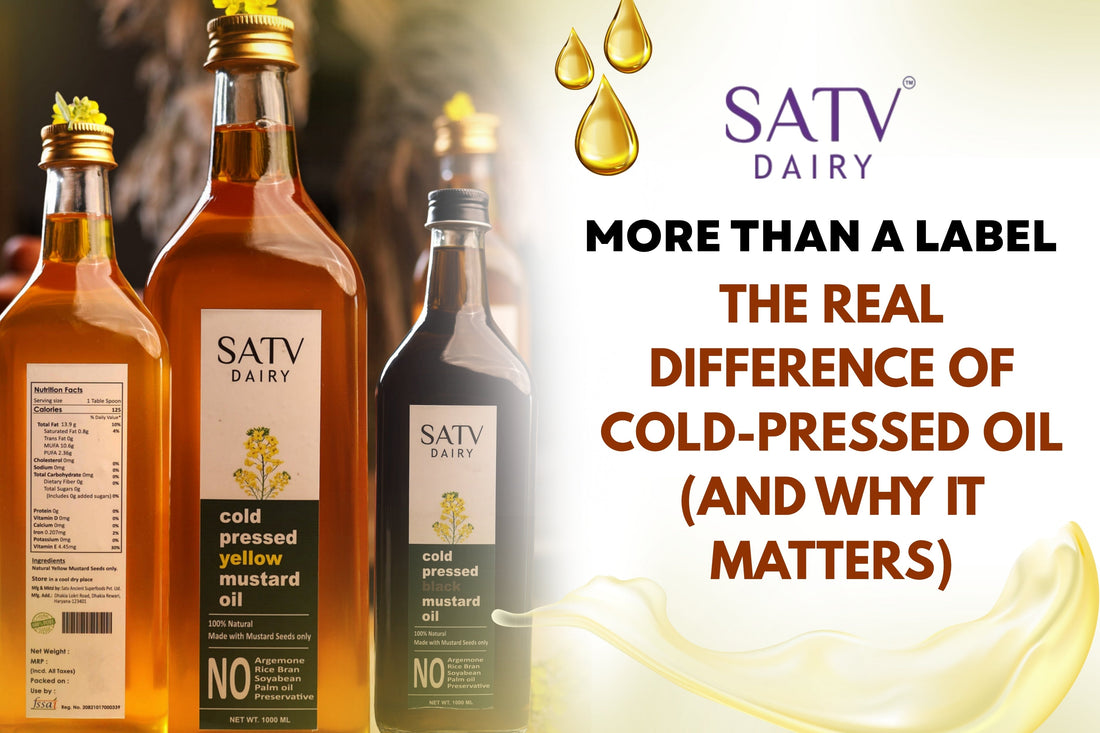Let's be honest, the cooking oil aisle at the supermarket is a confusing place.
You'll see labels like "refined," "lite," "extra-virgin," and "cold-pressed." They all sound healthy, but what do they actually mean? For most of us, we just grab a bottle and hope for the best.
But here’s a little secret: the way an oil is made changes everything. It's the difference between a food that is "nutritionally dead" and one that is vibrant, flavorful, and packed with health benefits.
Today, we're going on a journey "behind the label" to understand the real difference of cold pressed oil. This isn't just about a trendy name; it's about a return to purity that has been at the heart of traditional Indian kitchens for centuries.
What Does "Cold-Pressed" Actually Mean?
In the simplest terms, cold-pressing is a traditional, mechanical method of extracting oil from seeds (like mustard, sesame, or coconut).
Think of the old-school "Kachi Ghani" (or Kolhu). Seeds are crushed or "pressed" at a very low temperature, without the use of any added heat or chemical solvents. The oil that is released is then simply filtered and bottled.
That's it. It’s a slow, simple, and gentle process. The result? An oil that is:
-
Nutrient-Rich: Because no heat is used, the oil retains all its natural goodness—vitamins (like Vitamin E), antioxidants, and healthy fats (like Omega-3s).
-
Flavorful & Aromatic: Cold-pressed oil tastes and smells like the seed it came from. That pungent mustard oil or nutty sesame oil? That's the sign of purity!
-
Completely Pure: It's just 100% oil, with no chemical residues left behind.
The "Other" Method: How is Refined Oil Made?
So, if cold-pressing is so great, why does refined oil even exist? The answer is simple: efficiency and profit.
The industrial refining process is designed to extract every last drop of oil from the seeds, as quickly and cheaply as possible. This involves:
-
High-Heat Extraction: The seeds are blasted with high temperatures (often over 200°C / 400°F).
-
Chemical Solvents: A chemical solvent, often hexane (a petroleum byproduct), is used to dissolve the oil from the seed pulp.
-
Refining & Deodorizing: The crude oil is then "cleaned" with more chemicals to bleach it (for a light color) and deodorize it (to remove all smell and taste).
The end product is a bland, neutral-tasting oil with a long shelf life. But this harsh industrial process strips away virtually all the vitamins, antioxidants, and natural flavor. What you're left with is a "dead" fat, often containing unhealthy trans-fats created by the high-heat processing.
Why We Believe in the Process
So, why are we at Satv Dairy so passionate about this?
Because we believe the process matters just as much as the product.
This commitment to purity isn't just about our cold pressed oil. It's our entire philosophy. It's the very same reason we make our A2 ghee using the traditional Bilona method—churning curd from A2 milk, not just separating cream with an industrial machine.
It’s about protecting the natural intelligence of the food.
-
Why sell a "lite" oil stripped of all its Vitamin E?
-
Why sell a "ghee" that’s just a processed fat, lacking the traditional healing properties?
We believe in providing clean, wholesome, and nutrient-dense foods. We trust the wisdom of tradition, which always prioritized nourishment over industrial efficiency. From our pure dairy products to our pantry staples, our promise is to deliver food that is as close to nature as possible.
Your Kitchen Deserves Real Food
Choosing cold pressed oil is more than just a health trend. It's a conscious decision to choose real food over a processed imitation. It's a vote for purity, nutrition, and flavor.
The next time you're cooking, take a moment to smell your ingredients. When you open a bottle of real Kachi Ghani mustard oil, you should smell the sharp, pungent mustard. When you open a jar of our Bilona A2 ghee, you should smell the rich, nutty aroma of cultured butter.
That’s the smell of purity. And it’s what your kitchen deserves.


 Whatsapp us!
Whatsapp us!